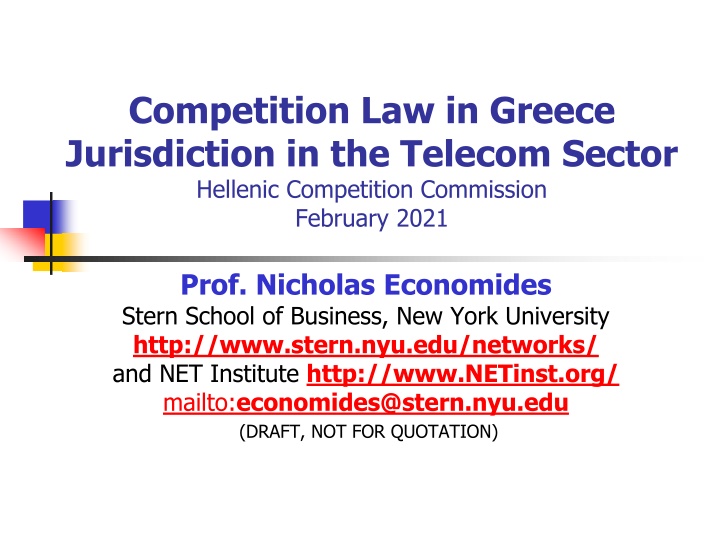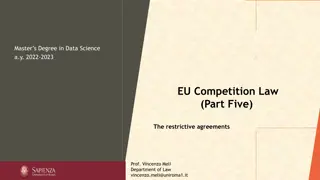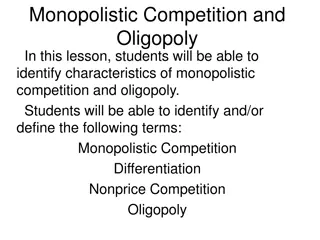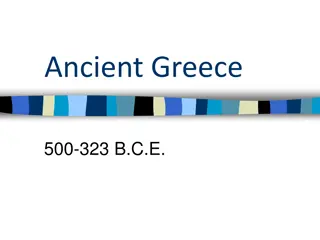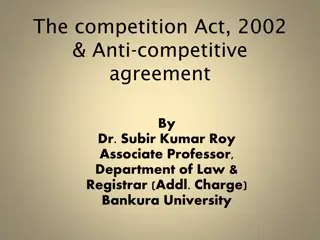Competition Law in Greece: Implications for the Telecom Sector
Explore the major revision of Greek competition law in 2020/21 and its impact on the jurisdiction in the telecom sector. Learn why applying the same competition law across all sectors is essential for fairness, regulatory capture prevention, and harmonizing prices with the EU. Discover how aligning Greek laws with EU regulations benefits businesses and consumers alike.
Download Presentation

Please find below an Image/Link to download the presentation.
The content on the website is provided AS IS for your information and personal use only. It may not be sold, licensed, or shared on other websites without obtaining consent from the author.If you encounter any issues during the download, it is possible that the publisher has removed the file from their server.
You are allowed to download the files provided on this website for personal or commercial use, subject to the condition that they are used lawfully. All files are the property of their respective owners.
The content on the website is provided AS IS for your information and personal use only. It may not be sold, licensed, or shared on other websites without obtaining consent from the author.
E N D
Presentation Transcript
Competition Law in Greece Jurisdiction in the Telecom Sector Hellenic Competition Commission February 2021 Prof. Nicholas Economides Stern School of Business, New York University http://www.stern.nyu.edu/networks/ and NET Institute http://www.NETinst.org/ mailto:economides@stern.nyu.edu (DRAFT, NOT FOR QUOTATION)
Major revision of Greek competition law in 2020/21 Objectives: Alignment of revised Greek law with EU law Modernization of Greek law for new setups, such as platforms and ecosystems 2
Revised law applies competition safeguards to all business sectors At present, the EETT has exclusive jurisdiction in telecom sector in Greece The revised law applies competition safeguards to all business sectors Why? 3
Why should the same competition law apply to all sectors (1) Businesses should be equal under the law Not different treatment for retail or wholesale or telecom Matter of fairness No other country of the EU gives the telecom sector to a different regulator Uniformity aligns Greece with the EU 4
Why should the same competition law apply to all sectors (2) Vast literature on regulatory capture, i.e., the regulated companies control the regulator can happen much easier for sectoral regulators that antitrust (across industries) regulators Horrible example of AT&T keeping long distance prices high in 1950-1981 despite being regulated 5
Why should the same competition law apply to all sectors (3) Presently, Greece has some of the highest prices in Europe for digital telecom services Harmonization with the EU antitrust regime is likely to harmonize prices with those of the EU Use of the digitized public sector is in jeopardy because of high telecom prices Low telecom and electricity prices are crucial to attract investment both in the digital sector (MSFT) and in general 6
Why should the same competition law apply to all sectors (4) There is no conflict between competition and investment as we have seen in hundreds of cases where high investment companies also cut prices In any case, telecom companies cannot hold the government hostage The rule of law has to prevail 7
Why should the same competition law apply to all sectors (5) The revised law does not take away any of the technical jobs where EETT has expertise, such as the allocation of the spectrum 8
Even if it made sense decades ago to have a separate regulator for telecom it does not make sense anymore Telecom products are now easily combinable with non-telecom services In the present regime, in case of a potential violation, EETT would look on telecom-only issues, and HCC would look at the whole setup Needless and confusing duplication, bad for the companies and bad for consumers 9
The biggest problem to structural reforms in Greece Inertia Even the smallest change is feared by established incumbent groups because it could Make them work more Make them compete harder 10
Conclusion Harmonization with the EU requires all sectors to be under the HCC There are no advantages in having different regulators for the same issues Investment is encouraged by a stable and efficient regulatory environment 11
